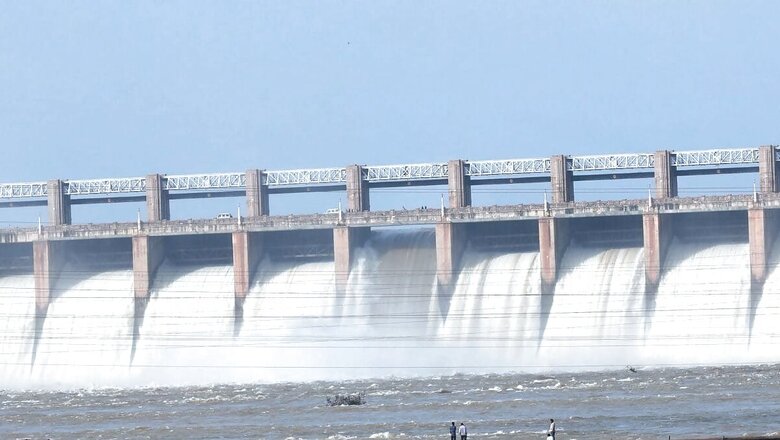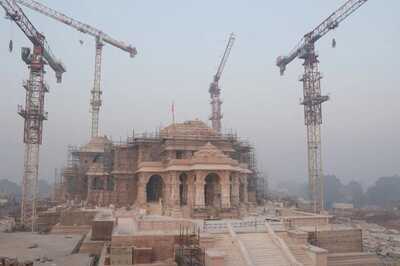
views
The washing away of a Tungabhadra dam gate in Karnataka has opened the floodgates to political blame-game in the state, even as the Andhra Pradesh State Disaster Management Authority cautioned people living along the banks of Krishna river to keep vigil. The mishap occurred in Hospet on Saturday night when the dam’s gate number 19 was washed away due to the intensity of floodwaters after the snapping of a chain link.
“Nearly 35,000 cusecs of floodwaters flowed and a total of 48,000 cusecs will be discharged downstream. People in Kurnool district’s Kosiri, Mantralayam, Nandavaram and Kouthalam should exercise caution,” the authority’s managing director R Kurmanadh said in a press release. He also advised Krishna river riparian inhabitants to avoid crossing canals and streams.
Karnataka’s Deputy Chief Minister DK Shivakumar said two firms had been approached to repair the dam gate. Fearing damage to the structure of the dam, all the gates were opened from where 38,000 cusecs of water is being released to neighbouring Andhra Pradesh and Telangana, Shivakumar said, adding that the inflow is 28,000 cusecs.
As the authorities try to plug the issue, News18 takes a look at the dam, functions of a crest gate and the political war of words over the mishap:
What is a crest gate & how does it function?
A crest gate, also known as a spillway gate, controls overflow or reservoir water level. According to Beijing IWHR Corporation, crest gates employ a bottom-hinged flap to manage water levels. Usually operated hydraulically, the gates rotate on their hinges, facilitating both opening and closing actions. The gates prove to be the optimal choice for allowing the passage of various materials, including ice, downstream, making it versatile for diverse situations.
An engineering portal says yet another advantage of crest gates is that they provide good control over the upstream level as they act like a weir with an adjustable top. Hence, they are more commonly used on dams where the upstream water level needs to be kept within a narrow range.
About the Tungabhadra dam
The over-70-year-old project was conceived by Sir Arthur Cotton, a British engineer from the Madras Presidency, in 1860 in an effort to provide irrigation facilities, generate electricity, and control floods in the region.
However, it was only in 1949 that the construction began as a joint venture between the Kingdom of Hyderabad and the Madras Presidency. The project was completed in 1953.
Also known as Pampa Sagar, the dam is situated across the Tungabhadra River near the towns of Hosapet and Koppal. The Tungabhadra reservoir and the Mullaperiyar dam in Kerala hold the unique distinction of being the only two reservoirs in the country that were built using a combination of mud and limestone.
What went wrong on Saturday?
It was Saturday night when 40,000 cusecs of water was being released into the Tungabhadra river through 10 crest gates. At around 12.50am, the 19th gate dislodged after the chain link used to operate it broke, causing water to gush into the river. In an effort to reduce the pressure, all 33 crest gates were opened. By Sunday morning, the discharge increased to one lakh cusecs. This is the first such damage experienced by Tungabhadra Dam in its 70-year history.
“Water is flowing out of the crest gate with a lot of force. The water level of the dam has to reduce by 20 feet. Only then can the situation of the crest gate be assessed,” said Kannada and Culture Minister Shivaraj Tangadagi, who visited the site to inspect the damage.
Districts in the downstream, including Koppal, Vijayanagara, Ballari and Raichur, have been alerted, though authorities said chances of structural damage to the dam were low.
What’s the Solution?
The first step is to empty about 60 per cent of the reservoir so that the repairs can begin. According to dam officials, the discharge from the other gates will need to be increased to ease the pressure on the broken gate.
To replace the damaged gate, it is necessary to release at least 60tmcft of the 100tmcft of water currently stored in the dam. This process, along with the construction of a new crest gate, is estimated to take up to four days or possibly longer.
BJP Cries Foul
BJP has accused the Karnataka government of negligence and wastage of water, causing distress to farmers who are dependant on it for their sustenance.
Leader of Opposition R Ashoka accused Shivakumar — also the water resources minister — of working for his party high command instead of his department. “For him, party welfare is more important than people. If he had convened a meeting with the technical team, this would not have happened.”
BJP state president B Y Vijayendra said that more than 30 villages downstream of the reservoir were facing a flood threat and demanded that the government evacuate villagers from the area at the earliest.




















Comments
0 comment